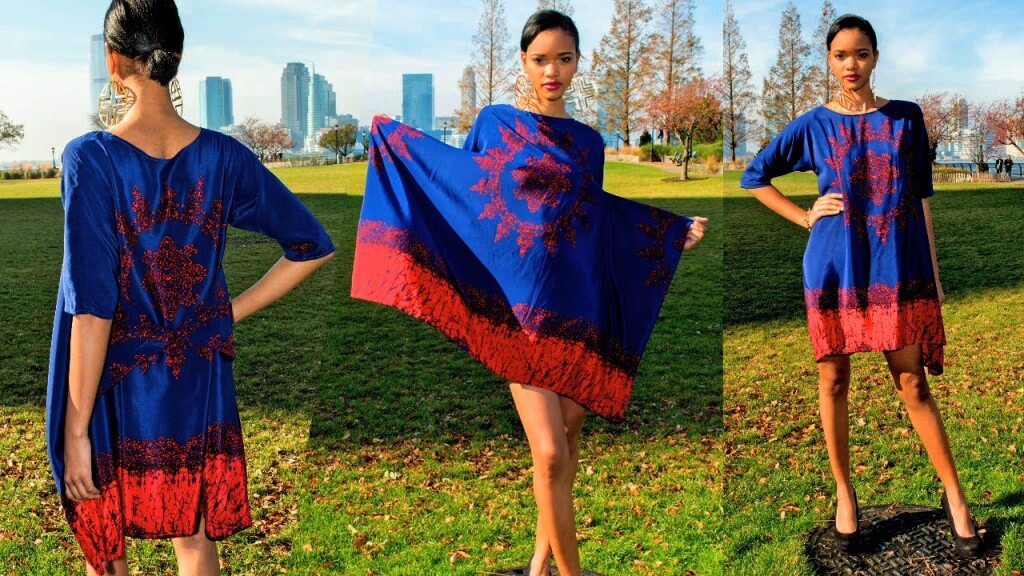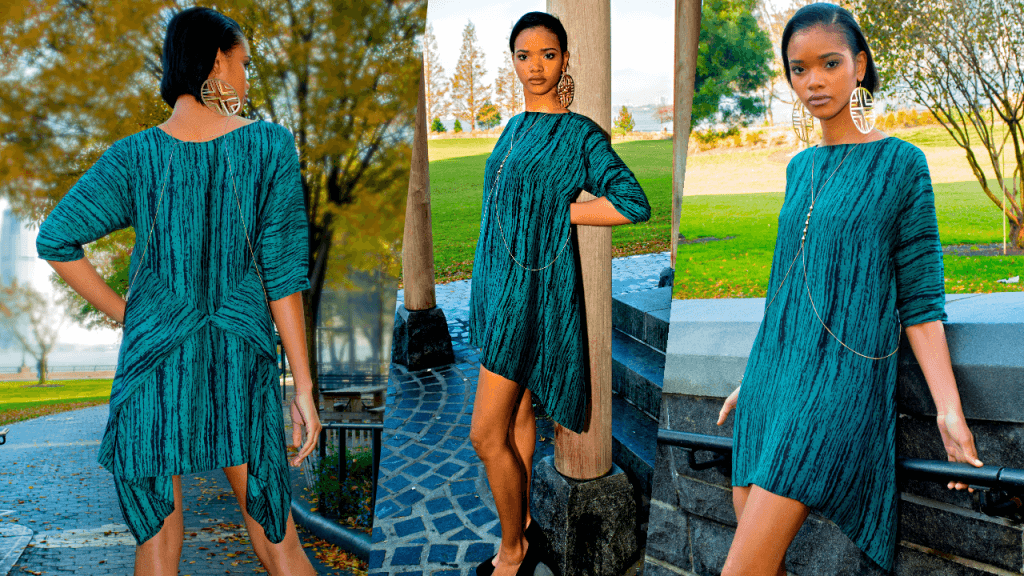Tabitha St. Bernard co-founded Tabii Just in 2012. A graduate of New York’s Fashion Institute of Technology, Tabitha fine-tuned her design skills with internships at Vivienne Tam and Tahari ASL. She went on to join the dress line design team at Tahari ASL, where she discovered her passion for sustainable fashion.
Tabitha started designing her own clothing before the age of 10. Born in Trinidad & Tobago, she now hails from Brooklyn, New York. She takes her rich Caribbean heritage with her to the design studio and traces of it are evident in every item of clothing. Tabitha is also as a fashion & beauty blogger for a range of websites, while writing her personal blog, Tabs On Fashion. As a designer and blogger, Tabitha is privy to a unique, well-rounded perspective on fashion.
Tabitha’s fashion line Tabii Just is a Zero Waste sustainable line of womens wear clothing made in New York City. The design aesthetic is a seamless marriage of Brooklyn edge and an easy-going Trinidadian vibe; designing easy-to-wear, effortlessly chic clothing with a distinct personality.
I had the pleasure of interviewing Tabitha about her humble beginnings from Trinidad, her clothing line and growth potential for Caribbean designers.
S&V: Tell me about how you got started?
Tabitha: Started 5 years ago, I came to the US to go to school at St. Francis College, I didn’t study fashion. I actually studied psychology and got a job in that field. I turned 25 years old and had a sort of quarter life crisis. I was doing what I liked, but not what I loved. I’ve always dabbled in fashion; remaking clothes, sketching at a young age in Trinidad, so I decided to apply to FIT. I kept my full time job and went to school at night. While completing my degree I interned for Tahari ASL and eventually joined the dress team. I knew I wanted to have my own line inspired by my culture and fashion with a conscience.
S&V: Tell me more about the line being eco-friendly (zero-waste)?
Tabitha: Making clothes in the U.S. is costly because the labor is expensive there are strict labor guidelines (employees need to have sick leave, vacation time, benefits etc.); those workers put their energy into your clothes. If you look at the some of the working conditions for factories abroad, in China for example, they live in dorms, working tirelessly around the clock for a portion of their life, I just couldn’t see myself supporting that. The advantage of producing locally is that I can keep an eye on my designs, which is very important, and I can see how they (manufacturers) are working. They are happy with my vision and are interested in it being executed as much as I do. They know I hate to waste fabric and they know to save anything to see if I can re-use. About a year ago I decide to do an eco-conscious line using organic fabric. While at FIT I learned about sewing and draping skills which allowed me not to waste fabric. I find ways to incorporate those items into other items like accessories.
S&V: How did you first launch the line?
Tabitha: I focused on the product and raising funding. I’ve also been blogging a lot about what I’ve been doing to launch the line. It resonated extremely well with fellow bloggers. I didn’t set up an e-commerce site right away. Right now I just fill special orders and requests for specific designs found on the site, but we’ll have items available for online purchase in the spring.
S&V: What’s your long term vision?
Tabitha: Within five years I’m hoping to be selling in a couple countries, especially in Trinidad. I’d like to connect with U.S. and international buyers to make the line available in stores. Over the next 20 I’m homing for more manufacturing in Trinidad, using local factories to create and distribute from Trinidad. My dream would be to open a Fashion School in Trinidad & Tobago.
S&V: With so many talented designers in the Caribbean, what are your thoughts on how they can expand?
Tabitha: Interesting point, I think Anya’s (Ayoung-Chee; winner of Project Runway Season 9 ) shed light on the talent from the Caribbean. Growth in fashion will come from facilitating manufacturing. Government should invest on building a manufacturing setup in the Caribbean, allotting proper wages, putting together a union. The talent has to be backed by infrastructure. The more talent is nurtured, not having to go overseas for schooling, internships and jobs, it will help to build the industry.
S&V: Any last thoughts?
Tabitha: Please be sure to support the line! Look out for more designs in the spring and contact me with any special requests.
Support Tabii juSt and keep up with designer Tabitha and her endeavors on Facebook, Twitter, Pinterest and Linkedin






Leave a Reply